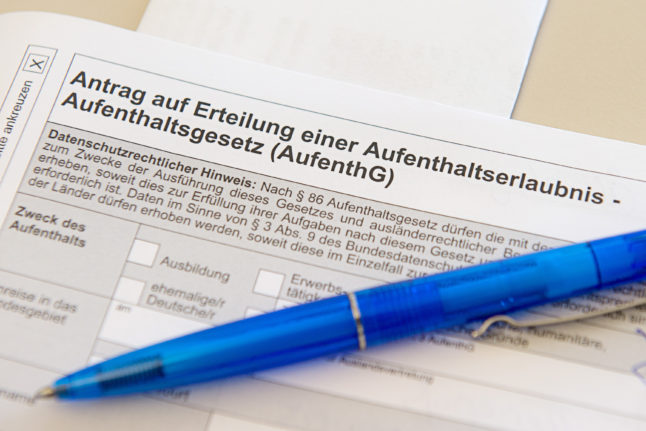Whether it’s the launch of a brand new visa for jobseekers or the passing of Germany’s long-awaited dual nationality law, 2024 is bringing with it a lot of exciting news for immigrants.
Last year in November, the government brought in the first phase of its new skilled worker law, with lower salary thresholds for Blue Card applicants and more flexibility for skilled workers to work in a range of professions.
We covered all the changes you need to know about in a previous explainer, so be sure to check that out if you haven’t already:
How Germany’s immigration rules are changing in November 2023
This year, two further sets of changes will be rolled out in March and June. That will complete the process of shaking up Germany’s immigration rules to bring more qualified people into the country.
So you know exactly what to expect – and when – we’re giving you the lowdown on how immigration rules could be transformed in the coming months.
Special work permit for recognition of qualifications
One major hurdle for people who want to work in Germany is the arduous process of getting foreign qualifications recognised in your state. To ensure this doesn’t delay the start of life in Germany, people will in future be able to live and work in the country while waiting for their qualifications to be recognised – even if they haven’t started the process yet.
In most cases, skilled workers will need an employment contract and a qualification requiring at least two years of academic or vocational training, as well as A2 German. Visas will be issued for 12-24 months and can be extended, meaning workers can spend up to three years in Germany while waiting for their qualifications to be recognised.
If foreigners need to undertake a skills analysis to prove their competence in their chosen profession, they can also apply for six-month visa for this purpose. Generally, A2 German will be required.
These new changes apply from March 1st, 2024.
READ ALSO: A1 to C2: What are the different levels in German and how do I reach them?
Quicker routes to permanent residence
This is a big one for skilled workers: this group will be able to get a permanent residence permit in Germany in as little as 21 months, or less than two years.
From March, foreign professionals who hold a skilled worker permit in Germany will have the chance to get a settlement permit after just three years, rather than the current four. For Blue Card holders, this will be possible after just 27 months, or 21 months with B1 German.
The rules for graduates of German universities will remain the same: permanent residence will be possible just two years after finishing their degree or vocational training, provided they’ve been in employment.

Changes for healthcare workers
From March 1st, life should get that little bit easier for nurses and other healthcare workers from third countries. To combat the dire worker shortages in the health and care sectors, nurses and nursing assistants can apply to work in Germany with less than three years of training. The main prerequisite is that they have relevant vocational training or a nursing qualification that is recognised in Germany.
Graduates who have completed their training as a nurse or care worker in Germany will also be given the chance to stay for up to 12 months in order to look for employment. If they can prove they are financially secure, this jobseekers’ visa can be extended by another six months.
Relaxed family reunification rules
A hugely emotive issue for The Local’s readers, Germany’s strict family reunification rules have forced many people into difficult choices. But for future skilled workers who move to the country, things will be much more relaxed.
Anyone who arrives in Germany on a skilled worker permit or Blue Card after March 1st will be able to bring their parents to live with them in Germany. If their spouse is also a permanent resident of Germany, the same will apply to parents-in-law.
In addition, the requirement to prove sufficient living space will no longer apply for anyone wanting to bring their dependent children or spouses to Germany.
READ ALSO:
- INTERVIEW – ‘Germany’s family reunion rules should be non-discriminatory’
- How foreigners will be able to bring their families to Germany under new skilled worker law

Visas for people with start-up grants
People with the entrepreneurial spirit will also see more doors open for them in Germany. If you secure a start-up grant from a German public body or research association, you can apply for an 18-month visa that will allow to come to Germany in order to get your business of the ground.
To be eligible, you’ll need to qualify as a skilled worker according to German law, which means holding either a university degree or a vocational qualification.
More rights for students to take up part-time work
International students who want to finance their studies through a part-time job will be in future be able to increase their earnings by working additional hours.
Under rules before March, third-country nationals studying in Germany could work up to 120 full days or 240 half days per year. This will be increased to 140 full days or 280 half days from March 1st. Alternatively, non-EU students can work up to 20 hours per week in a part-time job alongside their studies, just like their EU and German counterparts.
In another piece of good news, people who are undergoing preparatory courses before university – for example, to get their German up to scratch – will also be able to work from day one. The same will apply to anyone who comes to German on a visa for applying to university.
READ ALSO: How to finance your master’s studies in Germany as an international student
More options for would-be apprentices
People looking for an apprenticeship in Germany can already move to the country on a six-month permit, but now far more people will be eligible to apply.
From March, the current age limit will be raised from 25 to 35 and the language requirements will be lowered to B1. Visas will also be issued for up to nine months, rather than just six.

Visas for seasonal or short-term workers
In a move seemingly aimed at seasonal workers, employers will soon be able to hire non-EU nationals to come and take up temporary work in Germany. To meet the criteria, the workers need to be employed for 30 or more hours a week and no more than eight months in any 12-month period.
On their end, employers will also need to pay employees’ travel costs and ensure that workers’ rights and collective agreements are respected. This new visa route will come into force in March.
Later in 2024 – Introduction of job search opportunity card
Perhaps the biggest headline change in the new skilled worker law, Germany is set to introduce a new type of jobseekers’ visa known as the opportunity card. This is scheduled to happen from June 2024. It will allow people to move to Germany for up to a year to look for a job and work up to 20 hours a week while they do so.
People whose professional qualifications are recognised in Germany can get one of these automatically, but other non-EU nationals will have to meet certain basic criteria like having a foreign degree or other qualification and proving either A1 German or B2 English.
In addition, they’ll need to accrue up to six points for things like German language skills, connections to Germany, professional experience and age.
READ ALSO: Chancenkarte: How many points could you get on Germany’s planned skilled worker visa?
Extension of West Balkans regulation
Under a clause that was meant to expire in 2023, people from the West Balkan countries of Albania, Bosnia and Herzegovina, Kosovo, Montenegro, North Macedonia, and Serbia are able to enter the German job market in any non-regulated profession.
In June, this will be extended indefinitely, with a quota of 50,000 employment visas per year.




 Please whitelist us to continue reading.
Please whitelist us to continue reading.
Member comments